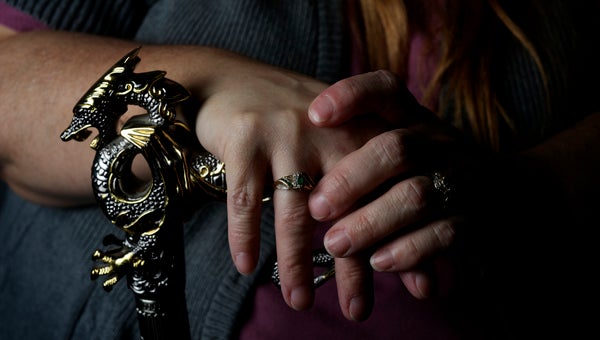Reece survives shooting
Published 6:41 am Saturday, February 25, 2012

The bullet that Katherine Reece was shot with broke her right hip and lodged in a bundle of nerves that controls her right leg, where it still remains. She suffers from arthritis and uses a cane to walk.
Katherine Southard Reece swears she heard her father’s voice on one of the most horrific days of her life, calming her with words ingrained in her mind since childhood.
“I heard Daddy tell me, ‘Katherine, if you panic, you’re lost.’ I heard him so clearly I tried to turn my head.”

Unlike many women who find themselves in abusive relationships, Reece grew up in a stable home with two loving parents. But like other domestic violence survivors, she lacked the confidence to leave her abuser. It took her 19 years to end the relationship with her ex-husband Sid and file for divorce. Reece is open about her past, hoping it raises awareness about how common domestic violence is. She also often talks with women trying to get out of abusive relationships.
The memories are so vivid that, even years later, Reece reaches for a tissue as she recounts the morning she almost died at the hands of her ex-husband, Sid.
Although Reece’s father had passed away two years prior, she clung to his familiar words like a starving man to his last piece of bread.
Reece fought for every breath as she tried to reason with her ex-husband as he pinned her to the ground and repeatedly shoved a gun into her mouth.
“I calmed down and I started talking to Sid and telling him that he didn’t want to do this,” she said. “Our son would basically be an orphan because he’d have one parent dead and one parent in jail … and then he put the barrel of the revolver up to my forehead, and he pulled the trigger.”
WARNING SIGNS
Reece can pinpoint the time when her first husband, Sid, began hitting her—right after their son was born in 1981—but the emotional abuse began almost immediately after they married in 1978.
“About the first two years in my marriage was just his conditioning me,” Reece said. “He doesn’t start out with hitting you. It starts out with little things, and it keeps getting worse and worse and worse until they’re standing there saying, ‘You are so ugly, you’re so stupid, you’re so fat, you can’t take care of the house.’ The first time they hit you, you actually think that you deserved to be hit.”
Reece met Sid when she was 17 and he was in his late 20s. He was divorced, and she was fresh from her parents’ house. They married three months after they met.
“Getting rushed into a relationship is also one of the warning signs,” she said. “As a younger woman, you haven’t really got out and started making your mark in the world yet.”
Sid left his marks on Reece, but never where they would be visible in public.
“He never hit me in the face,” she said. “He would back me up against the wall and hit me in the stomach because it didn’t show, and I remember there were times that he hit me hard enough that I threw up.”
The abuse manifested itself in different ways as the 19-year marriage dragged on.
Sid seemed to be a ticking time bomb, and Reece was constantly afraid of igniting his short fuse.
“You end up walking on eggshells because you’re afraid to do anything that’s going to set him off.”
The eggshells might as well have been shards of glass. Even something as small as Reece accidentally breaking an egg yolk she was frying for Sid would elicit painful punishment.
“If I broke the yolk, I was in tremendous trouble. You can do every single thing that they want you to do, and they’ll still find something,” she said. “If I am cooking an egg, I still get nervous. It stays with you.”
She began to see all the telltale traps of Sid’s abuse, from his micromanaging the couple’s finances to his frequent, unpredictable fits of rage.
“It’s very embarrassing to admit to somebody that he’s not a great husband. Abusive men are exceptional liars because they know that society does not approve of this,” she said. “They have to present themselves to society as being an honest, upright, good husband. If you, as the abused woman, ever crack that public façade of his, he’ll go crazy on you.”
She said Sid occasionally brought other women to their house, even after their son, Ty, was born.
“After you’ve had their child, they now pretty rightly figure that they’ve got a lot of control over you, because you want to stay with the father of your baby. You want to have the relationship. You want your child to have a father.”
Sid would follow Reece to make sure she went wherever she told him she was going.
He was convinced she had a boyfriend despite her futile attempts to tell him it wasn’t true—despite her frequent visits to the hospital to see her father who was in a coma in ICU, not visits to her nonexistent boyfriend’s house.
Eventually, he began threatening Ty and the rest of Reece’s family because he thought she was lying.
BREAKING POINT
“As bad as everything was, it got worse when we realized that my dad was dying,” Reece said. “My father had smoked for years. When he was 63, it was obvious we weren’t going to keep him very much longer.”
Unlike many abused women, Reece had a non-abusive childhood, and her parents never separated or divorced.
“I’ve told people so many times, my parents made Ozzie and Harriet look dysfunctional,” she said. “They were just exceptional, and I had always told Sid that when the time came that I was going to lose my dad, I needed somebody there to catch me. He wasn’t there.”
Sid made everything about her situation worse, Reece said. For 19 years, she felt inexplicably compelled to stay with a man who degraded her in order to feel better about himself.
“I don’t know why I still couldn’t leave. Unless you’ve been there, you don’t really fully understand. There’s this weird bond that gets formed in abusive relationships. Even as much as you want to be away from them, you don’t think you can.”
According to Reece, the average woman leaves an abusive man seven times before it sticks.
Reece finally mustered up the courage to file for divorce.
After the first divorce hearing, she took their son to Sid’s residence in Birmingham to see him.
“He was very nice to me,” she said. “He was very nice, he was very polite, and I thought, ‘Wow, maybe we can have a calm divorce after all.’”
With bright feelings about the future, Reece drove home and went to sleep.
The nightmare began a few hours later.
At about 2 a.m., Sid pulled Reece out of bed by her hair, held a 9 mm Beretta to her forehead and tried to stuff rags down her throat to stifle her screams.
As he held her at the foot of the bed, Sid noticed Reece’s own 22 mm long-barrel revolver resting on her bedside table.
He let go of her for a moment, but it was long enough for Reece to scramble off the bed and down the hall.
As Sid caught up with Reece in the living room, he shot her in the back.
“I heard the noise, I knew the gun had gone off but I really didn’t think that I had been shot,” she said. “I went down. It took a minute or two for the pain to start in.”
Sid rolled Reece onto her back, trying but failing to pull her across the room and to the door.
“I fully think, and so did the police, that his intention was to shoot me and throw me someplace,” Reece said. “When he couldn’t pull me to the door, he got really frustrated.
“He sat down, straddling my chest. He pinned my arms with his knees, and he shoved the gun down my throat.”
Reece managed to wriggle her arms from underneath Sid’s knees and wrapped her hands around his hands holding the gun in her mouth.
“He would shove it in and I would pull it out, and his finger was on the trigger. I don’t know if we fought over the gun for five seconds or five years. You lose track of time a lot.”
As the two struggled with the gun, her father’s favorite saying from years of handling explosives in the United States Navy echoed in her ears.
“If you panic, you’re lost,” Reece’s father would say. She heard it that morning as clearly as if he had been sitting next to her on the floor.
Reece managed to talk Sid into pulling the gun out of her mouth. She then rolled onto her stomach and started spitting up blood.
“We both thought I had internal injuries,” she said, “But when he shoved the gun down my throat, it cut and gouged so much that I was bleeding. That’s where the blood was coming from.”
Sid beat and kicked Reece on and off for the next two hours.
Then he put the gun to her forehead and pulled the trigger.
It fell on an empty chamber, and Sid started to laugh.
“He thought that was the funniest thing he’d ever seen,” Reece said. “Then, with the hand holding the gun, he stroked my hair and said, ‘I love you, Katherine.’”
Sid held the gun up to her head again, but before he could pull the trigger, the phone rang.
It was Reece’s mother calling to check on her, unaware of what was happening.
After ignoring the call, Sid gathered all the phones to take with him so Reece couldn’t call for help. He emptied the bullets out of the revolver and left as quickly as he had come.
Reece managed to get her car keys and roll down the steps, climb into her car and drive to a neighbor’s house for help.
“I didn’t know how badly I was hurt,” she said. “I was a mess. My lips were huge. I was bruised up all over the place.”
When Sid shot her, the bullet entered her back and broke her right hip, ricocheting to the left and lodging itself in the nerve bundle that controls her right leg.
Doctors decided not to remove the bullet because they were afraid of causing more nerve damage.
Reece has been diagnosed with traumatic hip arthritis, sciatica, interstitial cystitis, peripheral neuropathy and osteoarthritis in the knee.
“The whole right leg is messed up, from toe to hip,” she said. “The nerves misfire. I could be sitting here talking to you just like normal, and then all of a sudden I’m bending over screaming.”
A blue and black lunchbox travels with Reece wherever she goes and holds a battery of medications, mostly painkillers and muscle relaxers.
But the intangible emotional pain sometimes eclipses the physical pain she must cope with day in and day out.
“Unless you’ve got a problem like mine where the physical abuse stayed with you, a lot of times the mental abuse is worse than the physical,” she said. “Your bruises heal, scars fade, but that mouth of his is still in your brain saying you’re stupid, you can’t do anything. The verbal abuse really is the hardest thing for most women to get over.”
ROAD TO RECOVERY
Reece finally got away from Sid in 1997.
“I fought for four years to get him into the courtroom. They will abuse you as long as they can, even after you get divorced. If you have a child with them, you get carted back into court a million times over child custody.”
Sid was eventually charged with attempted murder, felony assault and unlawful imprisonment and sentenced to 10 years in prison.
Reece met her new husband, Jeff, online in 1998. She credits him with helping her through the difficult days of the trial.
“I was still terrified,” she said. “He was wonderful.”
Reece could have completely shut out the idea of getting married again, but she found the partner in Jeff she never found in Sid.
“It’s so easy to say never, ever again,” she said. “I knew what I wanted in a boyfriend, mate, partner.”
Katherine and Jeff still live in the house in Clanton where Sid shot her.
Although Jeff has helped her work through her phobias from the years of abuse, she still avoids certain situations if they bring back bad memories.
She will not sit with her back to a door, even in a public place like a restaurant.
“She’d go for a table in the corner and sit with her back to the corner,” Jeff said.
The jingling sound keys make—like the jingling of Sid’s keys on his belt loop—would put her in a panic.
She couldn’t sleep with her back to the door or take naps in the afternoon until Sid died in prison a few years ago.
She cowered to everyone and avoided confrontation until Jeff renewed her confidence.
“You wouldn’t assert yourself for anything,” Jeff said, looking at Katherine and smiling. “I did too good of a job with that.”
Jeff and Katherine both said one of her worst mistakes was not going to a shelter.
“She thought, ‘He’s not going to come here and do anything to me,’” Jeff said.
A bullet imbedded in her hip is evidence to the contrary.
“I talk to women who are trying to get out,” Reece said. “I’m very open about my domestic abuse story because people do not realize how common it is.”
Reece and others provide online support and advice for women in abusive relationships. The closest shelter to Chilton County is the Sunshine Center in Montgomery.
“We talk to them about what they need to do to get out and to get out safely, so they don’t end up in this wheelchair,” she said. “You never, ever know what they’re capable of.
“It’s very difficult on us because we go in there and we talk to women who are going through what we used to go through. A lot of times, it gives us flashbacks where we have to sometimes sit and push back away from the table and breathe.”
Reece said one of the most important things she did during her darkest days was to keep a positive attitude.
“You can choose to live or die,” she said. Day after day, she has chosen to live.
When she isn’t counseling, Reece manages a website she created called “The Hall of Ma’at,” an archaeology discussion forum and has written a chapter in a college textbook.
“She couldn’t tell you in 15 days how much she loves history,” Jeff said.
Her website has been featured in Archaeology Magazine.
“On the Internet, if I’m not using my real name, I use ‘history geek,’” she said.
If Reece isn’t using her name, her son is. Reece’s legal name before she married was ‘Anna Katherine Southard,’ and Ty named his daughter Anna.
“When my son turned 18, he changed his (last) name to my maiden name, and now, I have an incredibly gorgeous, fantastic granddaughter who is named after me.”
This story is part of PROGRESS 2012, which is on news stands Saturday, Feb. 25 through Monday, Feb. 27.






